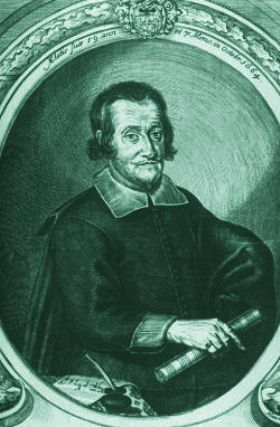<Back to Index>
- Composer Francesco Cavalli, 1602
- Composer and Violinist Antonio Bertali, 1605
PAGE SPONSOR

Francesco Cavalli (14 February 1602 – 14 January 1676) was an Italian composer of the early Baroque period. His real name was Pietro Francesco Caletti - Bruni, but he is better known by that of Cavalli, the name of his patron Federico Cavalli, a Venetian nobleman.
Cavalli was born at Crema, Lombardy. He became a singer at St Mark's in Venice in 1616, second organist in 1639, first organist in 1665, and in 1668 maestro di cappella. He is chiefly remembered for his operas. He began to write for the stage in 1639 (Le nozze di Teti e di Peleo) soon after the first public opera house opened in Venice. He established so great a reputation that he was summoned to Paris from 1660 (he revived his opera Xerxes) until 1662, producing his Ercole amante. He died in Venice at the age of 73.
Cavalli was the most influential composer in the rising genre of public opera in mid 17th century Venice. Unlike Monteverdi's early operas, scored for the extravagant court orchestra of Mantua, Cavalli's operas make use of a small orchestra of strings and basso continuo to meet the limitations of public opera houses.
Cavalli introduced melodious arias into his music and popular types into his libretti. His operas have a remarkably strong sense of dramatic effect as well as a great musical facility, and a grotesque humor which was characteristic of Italian grand opera down to the death of Alessandro Scarlatti. Cavalli's operas provide the only example of a continuous musical development of a single composer in a single genre from the early to the late 17th century in Venice — only a few operas by others (e.g. Monteverdi and Antonio Cesti) survive. The development is particularly interesting to scholars because opera was still quite a new medium when Cavalli began working, and had matured into a popular public spectacle by the end of his career.
Cavalli wrote forty - one operas, twenty - seven of which are still extant, being preserved in the Biblioteca Nazionale Marciana (Library of St Mark) in Venice. Copies of some of the operas also exist in other locations. In addition, two last operas ("Coriolano" and "Masenzio"), which are clearly attributed to him, are lost, as well as twelve other operas have been attributed to him, though the music is lost and attribution impossible to prove.
In addition to operas, Cavalli wrote settings of the Magnificat in the grand Venetian polychoral style, settings of the Marian antiphons, other sacred music in a more conservative manner (notably a Requiem
Mass in eight parts, probably intended for his own funeral),
and some instrumental music.

Antonio Bertali (probably March 1605 – 17 April 1669) was an Italian composer and violinist of the Baroque era.
He was born in Verona and received early music education there from Stefano Bernardi. Probably from 1624, he was employed as court musician in Vienna by Emperor Ferdinand II. In 1649 Bertali succeeded Giovanni Valentini as court Kapellmeister. He died in Vienna in 1669.
Bertali's compositions are in the manner of other northern Italian composers of the time and include operas, oratorios, a large number of liturgical works, and chamber music. Particularly his operas are notable for establishing the tradition of Italian opera seria in Vienna. Approximately half of his output is now lost; copies survive made by Bertali's contemporary, Pavel Josef Vejvanovský, some of the pieces are currently in possession of Vienna's Hofbibliothek, the library of the Kremsmünster Abbey and the Kroměříž archive. The most important source for Bertali's work is, however, the Viennese Distinta Specificatione catalog, which lists several composers of the Habsburg court and provides titles and scoring for more than 2000 compositions.